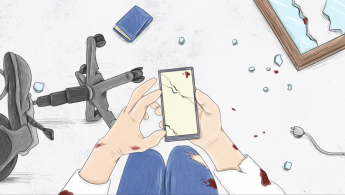WhatsApp Lebanon? How Lebanese really felt after the Beirut port blast
Editor's note: WhatsApp Lebanon? is an innovative storytelling project produced by The New Humanitarian, an independent, non-profit newsroom that covers humanitarian crises. The page features selected visual and text elements from the main feature, which can be viewed as an immersive, interactive timeline in full on The New Humanitarian’s website. The New Humanitarian collaborated with renowned Lebanese artist Rafik El Hariri on illustrations that depict the events being described in the WhatsApp messages and the people sending them. Leading this project were Annie Slemrod, The New Humanitarian’s Middle East Editor, and project coordinator Zainab Chamoun.
Panicked messages to loved ones, videos of fresh wounds, and screenshots of eerily accurate predictions. Two years since the catastrophic Beirut port blast, The New Humanitarian has used WhatsApp messages to allow Lebanese to tell the story of one of Lebanon's darkest moments.
Published last week, The New Humanitarian's ‘WhatsApp Lebanon?’ uses an illustrated, interactive timeline to showcase conversations five young Lebanese people had with their friends, family, and colleagues, from August 2019 - when a severe economic crisis hit Lebanon - until May of this year.
Upon hearing news of the blast, the young people, who are of Lebanese, Syrian, Palestinian and Ethiopian background, take to WhatsApp for different reasons.
Afaf, from the northern city of Tripoli, seeks confirmation of events from a friend in the capital; Roza, an Ethiopian woman who has been living and working in Beirut for years, is chastised by her mother for worrying about work at a time of crisis; Syrian-Armenian researcher Roger provides scathing criticism of the official Lebanese response to the blast. But all their messages are marked by a wearied shock.
The misery wrought by the blast came during already dark times for Lebanon, including the start of an economic crisis the World Bank would eventually deem to be among the worst the world has seen in centuries.
Hopes of a major change that arose during the 2019 protest movement had dimmed. These events and their everyday impact wrought an emotional toll on Lebanese, grinding them down.
"It was important to me that with this timeline, we not only showed those sorts of major incidents, but also what people were talking about, and feeling, as they happened," said The New Humanitarian Middle East Editor Annie Slemrod.
"The project shows that a country like Lebanon’s fall isn’t just about ‘newsworthy’ events, it’s actually an accumulation of multiple small-seeming, intimate moments – like waiting in an endless queue at the bank only to find there is no money, or trying to do your job without electricity."
WhatsApp - a free-of-charge call service that is the world's most popular messaging app - unexpectedly took centre-stage in Lebanon during protests in October 2019, after the government implemented a "WhatsApp tax" that it quickly reversed after public anger.
As shown in The New Humanitarian piece, the application has become an almost indispensable part of Lebanese life, allowing people to share eyewitness accounts, lash out at the government in relative safety, and send sometimes inarticulate but heartfelt voice notes.
Though the application can often be a starting point for news, with information shared there requiring thorough fact-checking by journalists, it is rarely its centrepiece.
There has been little let-up for Lebanese since the blast. Messages in the timeline post-blast cover, among other distressing events, blackouts (which interrupt WhatsApp conversations), deadly clashes between militias, and an end to medication subsidies.
Currently, three-quarters of Lebanon’s population live in poverty - a reality marked in the WhatsApp chats by updates on the unaffordably high prices of basic goods from baby formula to chicken.
Two years since the port blast, no official has been held accountable for what happened. A judicial investigation into events has stalled time and time again. Just last weekend, in an unsettling aftershock of the explosion, part of the Beirut port’s grain silos collapsed.






 Follow the Middle East's top stories in English at The New Arab on Google News
Follow the Middle East's top stories in English at The New Arab on Google News


